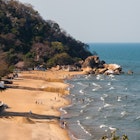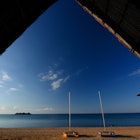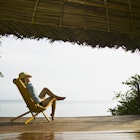

Plan a trip to the small southeast African country of Malawi with this guide for first-time visitors. Robin Bruyns/Shutterstock
Malawi’s tagline is "the warm heart of Africa," and while this sounds like a cliché it also rings true: the welcome you receive in this small southeast African country is as much a part of the experience as sundowner Malawi gins on the beach or the heartstopping sight of huge elephant herds and watchful cheetahs.
The country is a wonderful destination for lovers of the outdoors. Vast Lake Malawi is alive with a colorful abundance of little cichlid fish, lofty Mulanje lures hikers up its wooded slopes and the sweeping national parks have seen a heartening wildlife resurgence.
When should I go to Malawi?
Most visitors travel to Malawi between May and September, when the weather is generally temperate. In October the heat can get intense, but it’s a lovely time to see wildflowers on the high and cool Nyika Plateau. The "emerald season" in April sees Malawi at its greenest after heavy rains, though bear in mind that denser foliage may impede your wildlife-viewing opportunities. During the rains from (roughly) November to March roads can become blocked and deluges may impact your plans. An upside can be the lack of fellow visitors, giving a more authentic experience of Malawian life.
Music lovers should focus their visit around September’s Lake of Stars music festival, a long-running lakeside celebration of local and international sounds. Around the same time look out for the Sand Music Festival and the new and multi-disciplinary Cape Maclear Carnival, while the Tumaini Festival in November features the outstanding talents of the residents of Dzaleka Refugee Camp.

How much time should I spend in Malawi?
To travel the country from top to toe, give yourself a month to explore. Travelers who are focusing their travels around Lake of Stars should make time for at least two other destinations: a week can give you a tempting flavor of the country. Combine the festival with a visit to Liwonde National Park, where there are guaranteed sightings of roaming elephants and wallowing hippos, then head up the high escarpment at Livingstonia, where affordable and funky Mushroom Lodge represents ethical travel at its most enjoyable.
Is it easy to get in and around Malawi?
Travelers to Malawi arrive at the airport in Lilongwe or Blantyre (the Lilongwe plane drops off passengers and continues to Blantyre).
A fairly reliable coach network connects the main urban centers, while minibuses are not recommended – they only depart when they are full (which can take literally hours), and the sardine-can experience combined with wild driving makes for an uncomfortable experience.
The antique MV Ilala ferry plies up the lake linking its major settlements, and is a wonderfully scenic way to travel without the stress of driving. You’ll need to study the timetable to figure out your lake shore schedule and accommodation bookings, whilst taking it with somewhat of a pinch of salt, as delays are common.

Top things to do in Malawi
Away from the upmarket safari lodges, Malawi has some fantastically earthy accommodation options. Lakeside Cape Maclear is a great place to sample local life: at affordable lodges such as beachfront Warm Heart with its simple but attractive thatched huts you’ll swim alongside fisher folk. Take a boat trip to Thumbi Island to snorkel with brightly colored fish and watch eagles dive, then kayak along the lake shore as the sun begins to set. Simple local restaurants offer variations on chambo (fish) and chips, and at central Hiccups bar you can down a beer or two and have a dance.
My favorite thing to do in Malawi
Arriving in Lilongwe I always make a beeline for the Lilongwe Wildlife Centre, a miraculous stretch of riverine nature near the heart of the capital. It’s a refuge for rescued, orphaned and injured wild animals, whose progress you can chart on the Trust’s heart-melting insta feed. A raised boardwalk made from recycled plastic leads you through the trees and away from the crocs which have been known to meander the paths here – a reminder that this is a truly wild city. A good cafe and an excellent craft stall round off a top-notch visitor experience.

How much money do I need for Malawi?
While you can go as high-end as you like, mid-range lodges and hotels offer excellent value for money, and eating out is affordable. The country’s beautiful crafts, from basketry to clothes made from bright chitenje fabric, are very reasonable for the quality.
When it comes to safaris, Malawi offers great bang for your buck in contrast with neighboring countries. Parks like Liwonde feature affordable camping options as well as great locally owned lodges within or near the park boundary. Park entry fees are also reasonable compared to other African countries. Here's a guide to local prices in USD.
Beachside thatched lodge: $30–90+ per night
Coach ticket Lilongwe–Blantyre: $6
All-inclusive luxury safari lodge stay: $400+
Tailor-made suit: $15
Samosa snack: $1
Dinner for two: $25
Heineken "green" beer at the bar: $2
How do I pay for things?
Be ready to flash your cash in Malawi – many smaller places and cafes don’t take credit cards. Bring some dollars to exchange at the airport, just in case the ATMs aren’t functioning. Larger hotels and restaurants take dollars; otherwise you pay in the local currency, the kwacha.
Can I drink the water?
Unfortunately Malawi’s tap water isn’t drinkable. Instead of buying bottled water, invest in a filter water bottle that you can carry with you and top up as you go: these get rid of impurities and render the tap water safe.
Explore related stories









 Air TravelThese countries have imposed travel restrictions due to the Omicron COVID-19 variant
Air TravelThese countries have imposed travel restrictions due to the Omicron COVID-19 variantNov 30, 2021 • 6 min read

